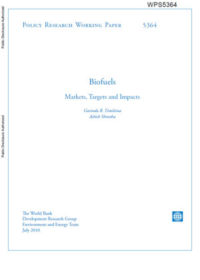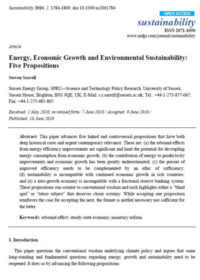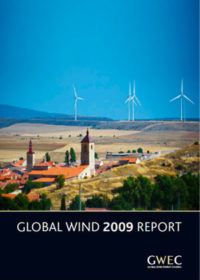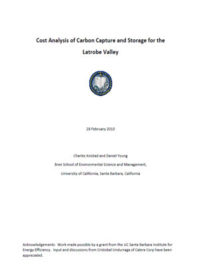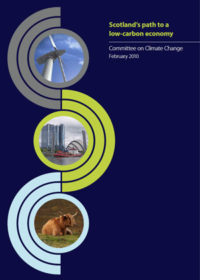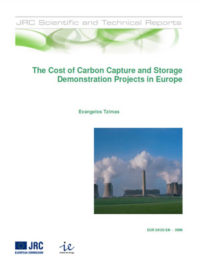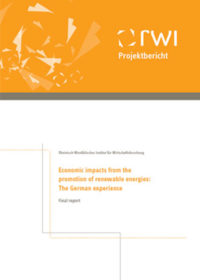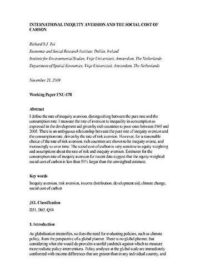Resources
Publications
Our publications, reports and research library hosts over 500 specialist reports and research papers on all topics associated with CCS.
View our Publication Library Disclaimer.
Filter by
Biofuels: markets, targets and impacts
1st July 2010
Topic(s): Biofuels / Bioenergy, Economics, Renewables
This paper reviews developments in biofuel markets and their economic, social and environmental impacts. In terms of climate change mitigation impacts, there exists a consensus that current biofuels lead to greenhouse gas mitigation only when greenhouse gas emissions related to land-use change are not counted. If conversion of carbon rich forest land to crop land is not avoided, the resulting greenhouse gas release would mean that biofuels would not reduce cumulative greenhouse gas emissions until several years had passed. Overall, results from most of the existing literature do not favor diversion of food for large-scale production of biofuels, although regulated production of biofuels in countries with surplus land and a strong biofuel industry are not ruled out. Developments in second generation biofuels offer some hope, yet they still compete with food supply through land use and are currently constrained by a number of technical and economic barriers.
Disclaimer
The content within the Global CCS Institute Publications, Reports and Research Library is provided for information purposes only. We make every effort and take reasonable care to keep the content of this section up-to-date and error-free. However, we make no claim as to its accuracy, currency or reliability.
Content and material featured within this section of our website includes reports and research published by third parties. The content and material may include opinions and recommendations of third parties that do not reflect those held by the Global CCS Institute.
Energy, economic growth and environmental sustainability: five propositions
18th June 2010
Topic(s): Economics, Energy efficiency
This paper advances five linked and controversial propositions that have both deep historical roots and urgent contemporary relevance. These are: (a) the rebound effects from energy efficiency improvements are significant and limit the potential for decoupling energy consumption from economic growth; (b) the contribution of energy to productivity improvements and economic growth has been greatly underestimated; (c) the pursuit of improved efficiency needs to be complemented by an ethic of sufficiency; (d) sustainability is incompatible with continued economic growth in rich countries; and (e) a zero-growth economy is incompatible with a fractional reserve banking system. These propositions run counter to conventional wisdom and each highlights either a - blind spot‖ or - taboo subject‖ that deserves closer scrutiny. While accepting one proposition reinforces the case for accepting the next, the former is neither necessary nor sufficient for the latter.
Disclaimer
The content within the Global CCS Institute Publications, Reports and Research Library is provided for information purposes only. We make every effort and take reasonable care to keep the content of this section up-to-date and error-free. However, we make no claim as to its accuracy, currency or reliability.
Content and material featured within this section of our website includes reports and research published by third parties. The content and material may include opinions and recommendations of third parties that do not reflect those held by the Global CCS Institute.
Disclaimer
The content within the Global CCS Institute Publications, Reports and Research Library is provided for information purposes only. We make every effort and take reasonable care to keep the content of this section up-to-date and error-free. However, we make no claim as to its accuracy, currency or reliability.
Content and material featured within this section of our website includes reports and research published by third parties. The content and material may include opinions and recommendations of third parties that do not reflect those held by the Global CCS Institute.
Global wind 2009 report
1st March 2010
Topic(s): Domestic policy, Economics, Project financing, Wind energy
This is the fifth annual report on the status of the global wind industry by the Global Wind Energy Council. It provides a comprehensive snapshot of this global industry - present in more than 70 countries. The data and country profiles for this report have been collected through GWEC’s member associations and companies around the world, as well as from other analysts and government contacts.
Disclaimer
The content within the Global CCS Institute Publications, Reports and Research Library is provided for information purposes only. We make every effort and take reasonable care to keep the content of this section up-to-date and error-free. However, we make no claim as to its accuracy, currency or reliability.
Content and material featured within this section of our website includes reports and research published by third parties. The content and material may include opinions and recommendations of third parties that do not reflect those held by the Global CCS Institute.
Cost analysis of carbon capture and storage for the Latrobe Valley
28th February 2010
Topic(s): Carbon capture use and storage (CCUS), Economics
This report assesses the cost and economic environment of different carbon capture and storage (CCS) technologies, in order to make a decision regarding the best approach for capturing and then sequestering the carbon‐dioxide (CO2) from the emissions of a brown coal fired power plant in Southeastern Australia. In this report, carbon capture and storage is defined as capturing the CO2from the plant’s flue gas emissions and securing this CO2 in a location where it will probably not be re‐released into the environment. Avoiding CO2 emissions due to process changes is also considered. Specifically, we consider well known technologies that require captured carbon to be compressed and sequestered underground and a new approach proposed by Calera Corporation. This report will focus on the levelized cost of electricity generation for each technology, as a function of the price for CO2 emissions, to compare the Calera process with the traditional CO2 capture processes. We will assume the local economic conditions that prevail in the Latrobe Valley in Australia.
Disclaimer
The content within the Global CCS Institute Publications, Reports and Research Library is provided for information purposes only. We make every effort and take reasonable care to keep the content of this section up-to-date and error-free. However, we make no claim as to its accuracy, currency or reliability.
Content and material featured within this section of our website includes reports and research published by third parties. The content and material may include opinions and recommendations of third parties that do not reflect those held by the Global CCS Institute.
Economics and policies for carbon capture and sequestration in the western United States: A marginal cost analysis of potential power plant deployment
1st February 2010
Topic(s): Carbon capture use and storage (CCUS), Economics
Carbon capture and sequestration (CCS) is a technology that can significantly reduce power sector greenhouse gas (GHG) emissions from coal-fired power plants. CCS technology is currently in development and requires higher construction and operating costs than is currently competitive in the private market. A question that policymakers and investors have is whether a CCS plant will operate economically and be able to sell their power output once built. One way of measuring this utilization rate is to calculate capacity factors of possible CCS power plants. To investigate the economics of CCS generation, a marginal cost dispatch model was developed to simulate the power grid in the Western Interconnection. Hypothetical generic advanced coal power plants with CCS were inserted into the power grid and annual capacity factor values were calculated for a variety of scenarios, including a carbon emission pricing policy.
Disclaimer
The content within the Global CCS Institute Publications, Reports and Research Library is provided for information purposes only. We make every effort and take reasonable care to keep the content of this section up-to-date and error-free. However, we make no claim as to its accuracy, currency or reliability.
Content and material featured within this section of our website includes reports and research published by third parties. The content and material may include opinions and recommendations of third parties that do not reflect those held by the Global CCS Institute.
Scotland’s path to a low-carbon economy sets out the Committee on Climate Change’s advice on how Scotland can meet its ambitious 2020 target, to reduce emissions of all greenhouse gases by 42%, and on the level of annual targets in Scotland. It also provides advice on the inclusion of aviation and shipping emissions and the use of carbon credits in Scotland, as well as on economic and social impacts of meeting the targets.
Disclaimer
The content within the Global CCS Institute Publications, Reports and Research Library is provided for information purposes only. We make every effort and take reasonable care to keep the content of this section up-to-date and error-free. However, we make no claim as to its accuracy, currency or reliability.
Content and material featured within this section of our website includes reports and research published by third parties. The content and material may include opinions and recommendations of third parties that do not reflect those held by the Global CCS Institute.
The cost of carbon capture and storage demonstration projects in Europe
13th January 2010
Topic(s): Carbon capture use and storage (CCUS), Economics
This report describes the methodology used for the estimation of the costs of the carbon capture and storage (CCS) demonstration programme in Europe. Financial needs have been estimated based on the calculation of the difference of lifetime capital and operating costs between CCS and conventional plants; and on assumptions concerning the composition of the CCS demonstration programme. The additional lifetime costs of a CCS demonstration plant have been estimated using reference values for the cost of the CO2 capture technologies (pre- and postcombustion and oxyfuel), which have stemmed from an extensive assessment of literature sources using a transparent methodology, which alleviates to a significant extent the confusion about the economics of CCS technologies.
Disclaimer
The content within the Global CCS Institute Publications, Reports and Research Library is provided for information purposes only. We make every effort and take reasonable care to keep the content of this section up-to-date and error-free. However, we make no claim as to its accuracy, currency or reliability.
Content and material featured within this section of our website includes reports and research published by third parties. The content and material may include opinions and recommendations of third parties that do not reflect those held by the Global CCS Institute.
Powering the future: mapping our low-carbon path to 2050
1st December 2009
Topic(s): Carbon capture use and storage (CCUS), Domestic policy, Economics, Fuel switching, Policy law and regulation, Renewables
Powering the Future evaluates options for CO2 emissions reduction across all sectors of the UK economy. Incorporating government published statistics on the current energy consumption and CO2 emissions of each sector, it creates models that allow each improvement option to be analysed and evaluated. Scenario analysis is used to apply a consistent set of such options across all the sectors to evaluate overall CO2 emissions and to compare the value of the different options.
Disclaimer
The content within the Global CCS Institute Publications, Reports and Research Library is provided for information purposes only. We make every effort and take reasonable care to keep the content of this section up-to-date and error-free. However, we make no claim as to its accuracy, currency or reliability.
Content and material featured within this section of our website includes reports and research published by third parties. The content and material may include opinions and recommendations of third parties that do not reflect those held by the Global CCS Institute.
Strategic analysis of the global status of carbon capture and storage: Report 2
1st November 2009
Topic(s): Carbon capture use and storage (CCUS), Economics
In May 2009, a consortium led by WorleyParsons and comprising Schlumberger, Electric Power Research Institute and Baker & McKenzie was engaged to undertake the Strategic Analysis of the Global Status of Carbon Capture and Storage.
The consortium was tasked to undertake a comprehensive survey of the status of CCS and to develop a series of reports analysing CCS projects, the economics of CCS, policies supporting CCS development and existing research and development networks. A fifth report - the Synthesis Report - was also developed and this summarises the findings of the first four reports, and provides a comprehensive assessment of the gaps and barriers to the deployment of large-scale CCS projects, including strategies and recommendations to address these issues.
Disclaimer
The content within the Global CCS Institute Publications, Reports and Research Library is provided for information purposes only. We make every effort and take reasonable care to keep the content of this section up-to-date and error-free. However, we make no claim as to its accuracy, currency or reliability.
Content and material featured within this section of our website includes reports and research published by third parties. The content and material may include opinions and recommendations of third parties that do not reflect those held by the Global CCS Institute.
Economic impacts from the promotion of renewable energies: the German experience
1st October 2009
Topic(s): Domestic policy, Economics, Energy security, Renewables
This paper reviews Germany’s Renewable Energy Sources Act (EEG), focusing on its costs and the associated implications for job creation and climate protection. The authors argue that German renewable energy policy, and in particular the adopted feed-in tariff scheme, has failed to harness the market incentives needed to ensure a viable and cost-effective introduction of renewable energies into the country’s energy portfolio.
Disclaimer
The content within the Global CCS Institute Publications, Reports and Research Library is provided for information purposes only. We make every effort and take reasonable care to keep the content of this section up-to-date and error-free. However, we make no claim as to its accuracy, currency or reliability.
Content and material featured within this section of our website includes reports and research published by third parties. The content and material may include opinions and recommendations of third parties that do not reflect those held by the Global CCS Institute.
International inequity aversion and the social cost of carbon
21st September 2009
Topic(s): Economics, Policy law and regulation, Social cost
Disclaimer
The content within the Global CCS Institute Publications, Reports and Research Library is provided for information purposes only. We make every effort and take reasonable care to keep the content of this section up-to-date and error-free. However, we make no claim as to its accuracy, currency or reliability.
Content and material featured within this section of our website includes reports and research published by third parties. The content and material may include opinions and recommendations of third parties that do not reflect those held by the Global CCS Institute.
